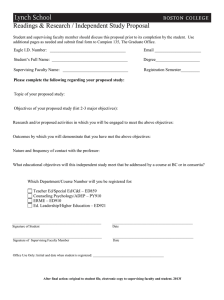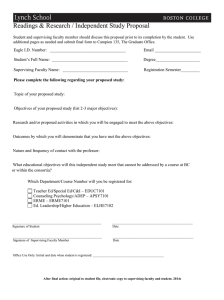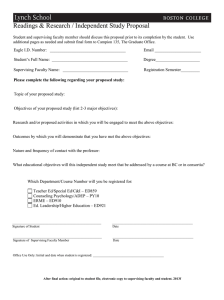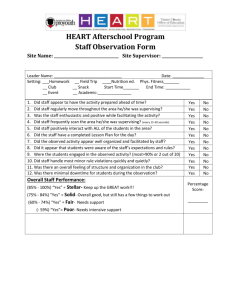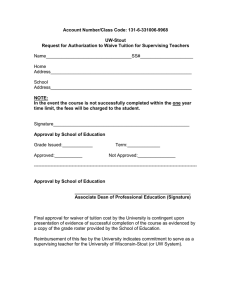Student Handbook THEATRE
advertisement
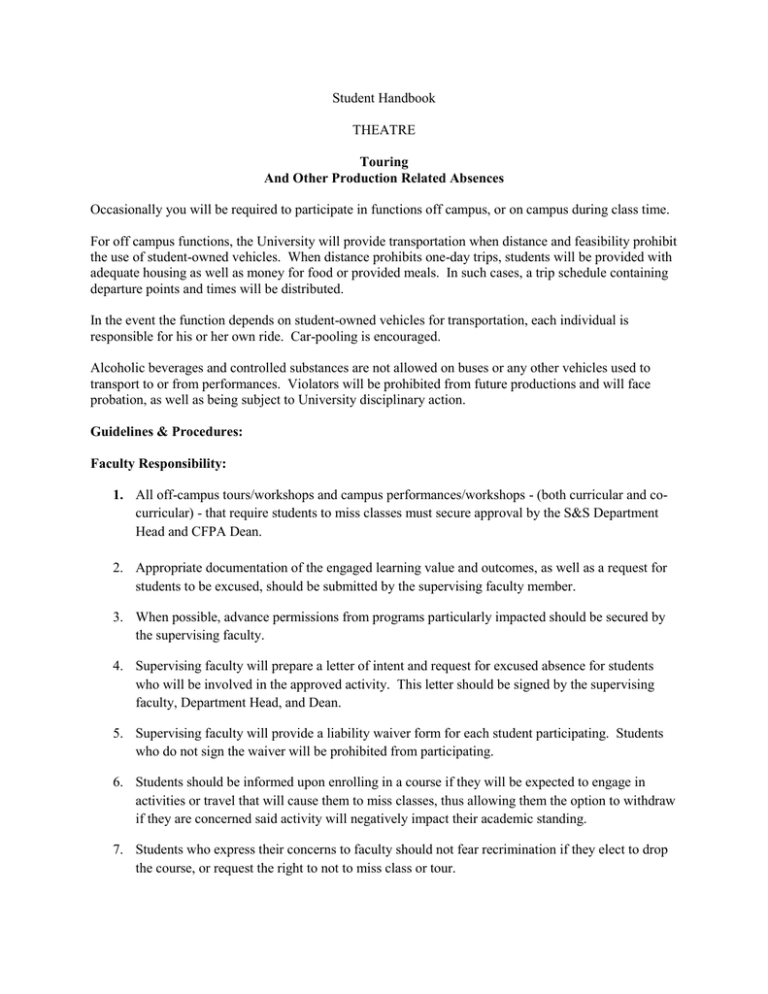
Student Handbook THEATRE Touring And Other Production Related Absences Occasionally you will be required to participate in functions off campus, or on campus during class time. For off campus functions, the University will provide transportation when distance and feasibility prohibit the use of student-owned vehicles. When distance prohibits one-day trips, students will be provided with adequate housing as well as money for food or provided meals. In such cases, a trip schedule containing departure points and times will be distributed. In the event the function depends on student-owned vehicles for transportation, each individual is responsible for his or her own ride. Car-pooling is encouraged. Alcoholic beverages and controlled substances are not allowed on buses or any other vehicles used to transport to or from performances. Violators will be prohibited from future productions and will face probation, as well as being subject to University disciplinary action. Guidelines & Procedures: Faculty Responsibility: 1. All off-campus tours/workshops and campus performances/workshops - (both curricular and cocurricular) - that require students to miss classes must secure approval by the S&S Department Head and CFPA Dean. 2. Appropriate documentation of the engaged learning value and outcomes, as well as a request for students to be excused, should be submitted by the supervising faculty member. 3. When possible, advance permissions from programs particularly impacted should be secured by the supervising faculty. 4. Supervising faculty will prepare a letter of intent and request for excused absence for students who will be involved in the approved activity. This letter should be signed by the supervising faculty, Department Head, and Dean. 5. Supervising faculty will provide a liability waiver form for each student participating. Students who do not sign the waiver will be prohibited from participating. 6. Students should be informed upon enrolling in a course if they will be expected to engage in activities or travel that will cause them to miss classes, thus allowing them the option to withdraw if they are concerned said activity will negatively impact their academic standing. 7. Students who express their concerns to faculty should not fear recrimination if they elect to drop the course, or request the right to not to miss class or tour. Student Responsibility 1. Properly informed (refer to #5) of course requirements that involve engagement and excused absences, students are responsible to participate in all course projects (including those that involve performance/exhibition/workshop). 2. Students submit the above referenced letter (refer to #4) to other faculty or program heads to request consideration to make-up missed work and that the absence be excused. 3. Students must arrange to make up missed assignments or exams, as per the directives of faculty who approve the excuse. When possible all make-up work should be done in advance of the day missed. This aspect should be negotiated by the student in advance of the absence to insure that their academic standing will not be negatively impacted. 4. Students must inform supervising faculty of any reasons that may pose a risk to their academic standing, should they miss class – so that alternate arrangement may be explored. 5. Students must inform supervising faculty of any personal extenuating circumstances that may negatively impact the program or university reputation. 6. Students must inform supervising faculty of any personal health concerns that could present a problem to their personal well-being. If prescribed medications/treatments are required, students must inform supervising faculty of the medications and purpose. (For example, if a student is diabetic and needs insulin on hand, or needs access to candy or juice.) 7. Students must inform supervising faculty of any personal conditions that may cause risk to the well-being of fellow students, or community participants (such as a contagious illness). 8. When participating with engagement activities, in particular, those which involve community members, students should be ever vigilant of their conduct and appearance as emissaries of WCU, the CFPA, and the Arts. 9. Students should dress appropriately for the event/activity (if in question, students may be advised by faculty). 10. Students should refrain from use of any inappropriate language, profanity, references, or actions. 11. Students should refrain from the use of tobacco products when in the presence of community children (even if in an outside environment which would otherwise permit smoking).
